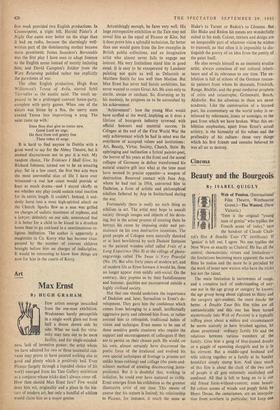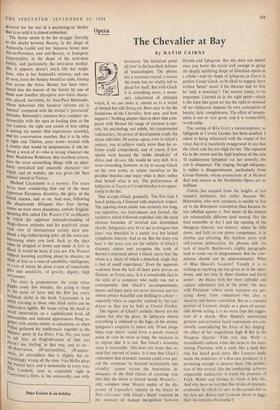Cinema —
Beauty and the Bourgeois
By ISABEL QUIGLY Web of Passion. (International Film Theatre, Westbourne Grove.)—The Wastrel, (New Victoria.) 'Tuts is the original "young man of genius" who typifies the French scene of today,' says the handout of Claude Chab- rol's film A Double Tour ('X' certificate). If 'genius' is left out, I agree. No one typifies the New Wave so exactly as Chabrol. He has all the central, characteristic virtues and limitations— the limitations becoming more apparent the more films he makes and the more he is parodied bY the work of lesser new wavers who have the tricks but not the talent.
The main limitation is narrowness of range, and a complete lack of understanding of any- one not in the age group or category he knows; the age group being about eighteen to thirty and the category spiv-student, the more louche the better. A Double Tour (his film titles are all untranslatable and this one has been turned mysteriously into Web of Passion) is a typically trifling piece about a milieu and circumstances he seems scarcely to have brushed against, let alone penetrated: ordinary family life and the relations between various members of the family. Give him a gang of blue-jeaned drunks or a gaggle of squealing shopgirls and he is in his element. But a middle-aged husband and wife talking together or a family at its Sunday breakfast simply stump him. And since much of this film is about the clash of the two sorts of people it all gets extremely unstitched and confused. All that is left to hang on to is our old friend form-without-content; some beauti- ful colour scenes of woods and popify fields bY Henri Decae, the cameraman, are an interpola- tion from nowhere in particular, but keep one
diverted for the rest of a psychological thriller that is so mild it is almost somnolent.
The theme seems to be the struggle (literally to the death) between Beauty, in the shape of Antoniella Lualdi and her Japanese house near Aix-en-Provence, and anti-Beauty, or bourgeois respectability, in the shape of the next-door family, and particularly the next-door mother. She, it appears, doesn't much like her neigh- bour, who is her husband's mistress, and can be seen, from the Sunday breakfast table, kissing hun across the fence. Beauty has been intro- duced into the bosom of the family by one of those now familiar disruptive new-wave charac- ters, played, inevitably, by Jean-Paul Belmondo, Whose behaviour (the handout informs us) is 'normal' compared with the mother's 'provincial' attitudes. Belmondo's manners here compare un- favourably with the apes at feeding time at the zoo (indeed, the sight and sound of him eating is among my nastier film experiences recently), and his conversation matches. But it is he who is right and Th6rese, poor mum—treated with a cruelty that would be preposterous if one be- lieved a word of it—who is wrong whatever she does. Madeleine Robinson, that excellent actress, does the most astonishing things with an abso- lutely unrealised and unactablc character—for Which, and no wonder, she was given the 'best actress' award at Venice.
Michael Cacoyannis is a mystery. For years We've been considering him one of the most important European directors, the glory of the Greek cinema, and so on. And now, following the disastrously bilingual Our Last Spring, comes an even more disastrous, entirely English- sPeaking film called The Wastrel ('A' certificate), in which his apparent misunderstanding of Anglo-Saxon attitudes and his positively cross- eyed view of international society have pro- duced a big embarrassing joke; all the more em- barrassing when you look back to the days When he stopped at home and made A Girl in black. It would be hard, if you saw The Wastrel Without knowing anything about its director, to think of him as a man of sensibility, intelligence, O r even of talent; let alone a man of remarkable Rifts and sensitivity, of gravity, dignity, high seriousness.
The story is preposterous, the script raises giggles every few minutes, the acting is inept to the point of farce and the film has every technical cliché in the book. Cacoyannis is an awful warning to those who think satire can be undertaken lightly. He keeps trying his hand at social observation on a sophisticated level, all nationalities and national appearances flung to- 1.ether with results almost as calamitous as when tnt gathered his intellectuals together at the St teiners' party in La Dolce Vita. No, you want tell him, an Englishwoman of that sort croester use 'darling' in that way, and so on — off-observation, off-nationalities, off-appear- ances, an atmosphere that is slightly but ex- ,e.rueiatingly wrong all the time. Van Heflin plays
e lie Wastrel hero, and is lamentable in every way.
Lambetti, once so exquisitely right in t--seoYannis's films, is the awkwardly cast wife.







































 Previous page
Previous page